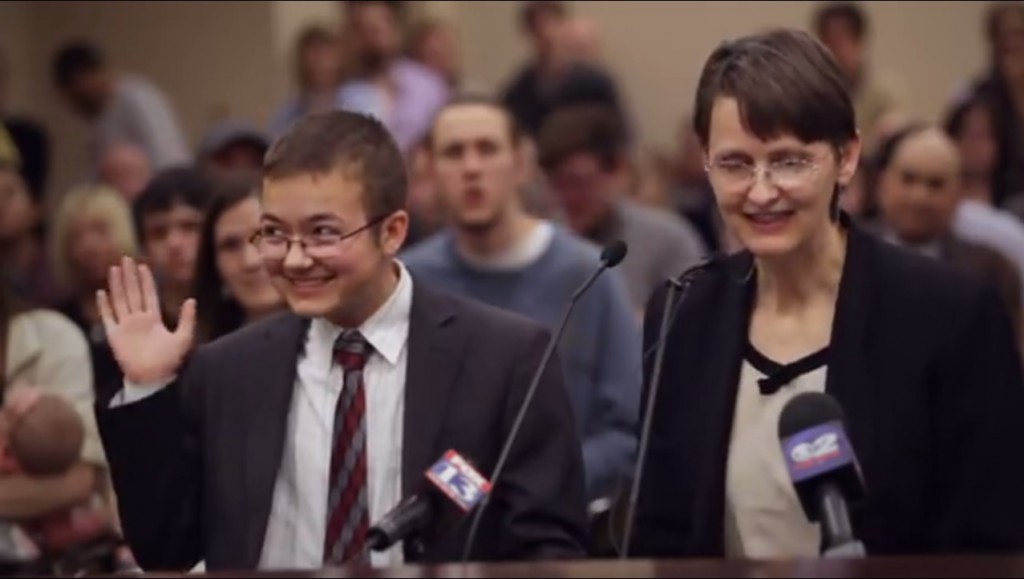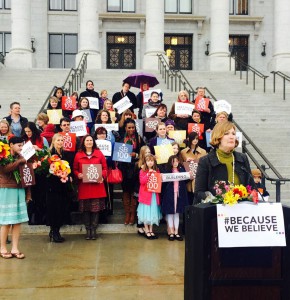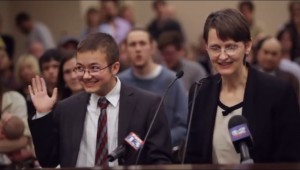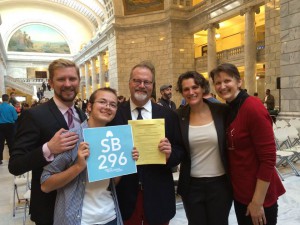A Mom Gets Involved

On March 12, Utah Governor Gary Herbert signed into law SB296 extending antidiscrimination protections in housing and employment to include sexual orientation and gender identity, while also restating and extending religious liberty protections. New Affirmation board member Neca Allgood shares her experiences participating in the political process that lead to this new legislation.
By Neca Allgood
Upon returning to Utah in 1998 (I attended BYU earlier) I found that the unusual political system here requires extra effort from its citizens. In 2004, I put my name forward at a local caucus meeting and won a spot at the state Republican convention where nominees for the gubernatorial primary were selected. Our sitting Governor, Olene Walker, who was relatively moderate and extremely popular with the general public, couldn’t make it past the first ballot. That really drove home the point that though Utah is a conservative state, the caucus/convention system makes the legislature much more so.
Though I’d been to meet the candidate nights, caucus meetings, and even the state convention, I’d never been involved in political causes and had never been to a political rally in Utah. That changed after 2011 when my son Grayson Moore discovered that he was FtM transgender. I was horrified to discover during that first year that it was still legal to discriminate against my child because of his gender identity, or against others because of their sexual orientation. Actually, this was not true everywhere in Utah because in 2009, Salt Lake City, a relatively liberal bastion, had passed a local non-discrimination ordinance that had been publicly endorsed by the LDS Church. Perhaps this was influenced by the flood of negative publicity coming from the battle over marriage equality in my home state of California. Since then, some additional local ordinances had passed, but the Church could not be persuaded to endorse legislation at the statewide level and things had gone nowhere.
So a year later in 2012 during the legislative session, I spoke at my first political rally. I was one of several speakers. I quoted General Authorities from the Mormons and Gays web site and Matthew 25. Several TV news stations and local papers had sent reporters, and our small group of LDS supporters of non-discrimination was almost outnumbered by the press.
Apparently several members of my Ward and Stake were disturbed by the news coverage, and reported on me to my Bishop and Stake President. The next week I was called in for an interview to discuss my political activity. I took along a copy of the talk I had given, which the Stake President read over and said, “This is what it says on the Mormons and Gays website.” In 2012, and still in 2015, many local church leaders are unaware of that website; it was a huge relief my Stake President was not one of them.
In 2013 Grayson and I again were part of a demonstration on the Capitol Steps, but this year the group was bigger. In the summer of 2012 Mormons Building Bridges marched in Salt Lake Pride parade for the first time, generating international news coverage. MBB helped open many church members’ eyes to the lack of protection against discrimination in Utah law, and the 2013 rally was advertised on MBB’s Facebook page. Grayson lead a group singing hymns as we marched across the sidewalks of the Capitol.
2013 was the first year that a non-discrimination bill made it out of committee. We sat in a committee room packed with LGBT people and their supporters, as well as representatives from the Eagle Forum and the Sutherland Institute who opposed the bill. Five supporters and five opponents were allowed to testify to the committee. Several of the opponents focused their objections on the “problem” of transgender people using public restrooms. Several Mama Dragons named this the “potty panic” objection. In the end, all the Democratic, and several Republican members of the committee voted in favor of the bill. However, the Senate leadership decided the bill didn’t have enough support to make it to the Senate floor for debate, so the bill died. At the end of the 2013 session Senator Urquhart, the Republican who became the sponsor of the legislation that year, was asked what reactions he had gotten since he became the sponsor. He said, “A lot of love and some pretty intense hatred, but that really makes me think. I’ve experienced it for about a week because of this issue. We have a lot of people who are experiencing it for a lifetime.”
After the slow progress made in 2013, hopes were high that 2014 would be a year the bill would finally reach the floor. Instead, the legal battles over marriage equality were in full flame, and the legislative leadership decided that, as a result, no bills related to LGBT rights would be heard during the legislative session. Equality Utah decided to prepare for the next year by holding a Compassionate Conversations hearing on the Capitol. Senators and Representatives were invited to come hear LGBT people and their family members testify about the impact the lack of protections had on them. [Testimony from that meeting is available on YouTube as Equality Utah opportunity 4all.] Joey Eccleston (another parent) and I talked about our concerns that our LGBT teenagers would need to leave the state to find equal opportunity. Even near the climax of a busy legislative session a number of legislators took the time to attend that meeting, and some heard for the first time from people who had been fired or homeless because they were LGBT.
After the 2014 legislative session ended Grayson and I were approached by Equality Utah. They felt that legislators were starting to feel more open minded about non-discrimination protections for gays and lesbians, but they were still resistant to providing those protections to the transgender community. Equality Utah wanted to do a series of short films to help communicate to Utahns that transgender people were just people, and to help people feel compassion for some of the issues they faced. These videos were called We Are Utah, and Equality Utah produced one featuring Candice Metzler, and another featuring Grayson and I. We will never know if those videos had an impact on the political process that lead to the passage of SB296 in Utah, but our family was contacted by people from all over the world who had seen our story. Most touching to me were the transgender people who shared our story with their conservative religious parents of other faiths. Several reported to us that our story led to the best conversations they had ever had with their parents.
On January 27, 2015 the LDS church held a news conference announcing support for legislation to provide protections in housing and employment for LGBT people, also calling for protections for religious liberty. This announcement, just ahead of the opening of Utah’s legislative session, raised hopes that this would be the year that legislation could finally be passed. Yet during the first few weeks of the session we heard very little about actual progress of a bill. I now know that during those weeks several senators were spending hours and hours with lawyers with expertise in civil and religious liberties crafting the detailed language of a bill. Half way through the session, with the word-smithing still going on behind closed doors, groups began rallying in support of non-discrimination legislation. Erika Munson of MBB organized a rally for the women of MBB to present the House and Senate with flowers to show our support of the legislation. We have had an almost snowless winter, but the day of that rally (outside on the Capitol steps) it was cold and snowing. Usually political rallies are posing for the media, but this amazingly well-organized event actually lured House and Senate leadership outside to accept the bouquets.
Finally on March 3, with less than two weeks left in the session the text of SB296 was released. The next morning at a rare joint press conference with LDS Church leaders, Equality Utah, and the leadership of both the House and Senate, the attendees announced support for the bill that combined both antidiscrimination and religious freedom amendments.
I read the text of the proposed amendments online, and that evening went to a town hall hosted by Equality Utah where lawyers discussed the language and meaning of the bill. I was in a hurry to understand it, because Grayson and I were scheduled to testify in favor of the bill before a Senate Committee the next day. The two of us testifying involves me talking and Grayson sitting in his suit and CTR tie, looking like the good student and kid next door that he actually is. I suspect that many legislators have a hard time imagining themselves as gay or transgender, but most of them ARE parents. It is easier for them to imagine themselves in my shoes. “What would I do if my child or grandchild came to me and said, “I’m transgender,” or “I’m gay.” My hope is my need for such legislation to protect my child will speak to their own instincts to protect everyone’s children.
Over the span of eight days I testified in both the Senate and House Committees that reviewed the bill, and attended both the Senate vote and the signing. Watching the legislature in action is a strange combination of feeling inspired by witnessing democracy in action, loathing for the backroom deal making and power seeking, love for the legislators and their staff who do incredible amounts of work, and bafflement that some particularly dim legislators ever got a district full of people to vote for them.
In the end, we got a law. It’s not a perfect law, but it does reiterate some of the important religious liberty protections already enshrined in State and Federal law and clarifies that individuals cannot be fired for political speech they make outside of the workplace. It also grants important new protections in housing and employment based on sexual orientation and gender identity. It even paves a path for employers and their transgender employees to communicate about gender specific work uniforms. Perhaps best of all, it guarantees transgender employees will be able to use the restroom. In short, it strikes a real blow against injustice against LGBT people, and a blow against “potty panic” as well.


